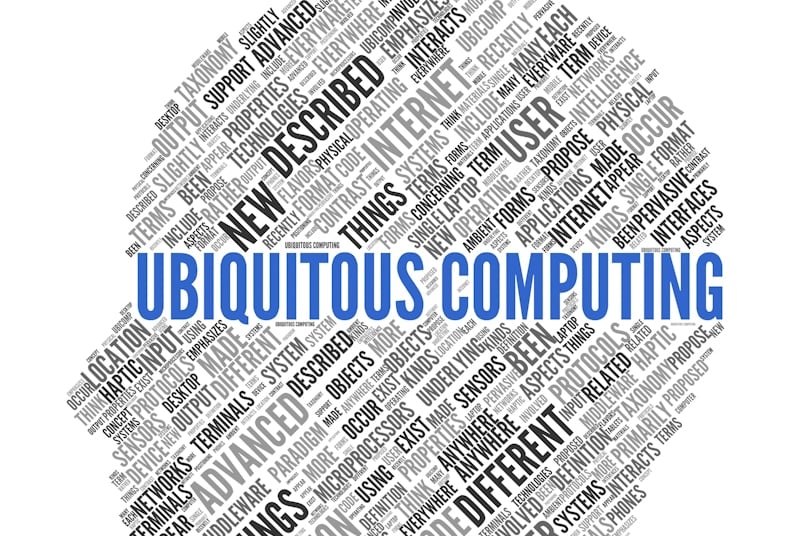Gold, diamond, luxury watches, etc., are rare and expensive because they are found in lesser quantities or made in limited numbers. Quite a few other things in life are, however, available in abundance – almost to the point that they seem to be everywhere or feel “ubiquitous”. So, what does “ubiquitous” mean, and when and how to use the term in a sentence?
The adjective “ubiquitous” means “omnipresent” or “everywhere”. It’s used in texts to denote things that seem like they can be found everywhere at the same time. That, however, is not the exact or complete truth. The word is, in fact, a form of overestimation or not wholly reflective of reality.
Keep reading to learn everything that there is to the term’s meaning, how to use it in sentences, and a host of other pertinent details.

“Ubiquitous” – Meaning
The term “ubiquitous” means “something present everywhere simultaneously”. The “ubiquitous” thing could be everywhere in literal terms. The word, however, is usually used to denote things that seem like they are all around.
“Ubiquitous” is an adjective. The noun and adverb forms of the term are “ubiquitousness” and “ubiquitously”, respectively. “Ubiquity” is another noun version of the word and a lot more common too. Also, “ubiquitism” is a valid term, which signifies the doctrine that states “the body of Jesus is omnipresent”.
The phrase “ubiquitous computing” is quite famous or “ubiquitous” (pun intended). It means or signifies computing occurs in any device and everywhere and is not limited to a desktop computer alone.
Other terms for the word are “omnipresent”, “everywhere”, “ever-present”, “worldwide”, pervasive”, “commonplace”, “familiar”, “quotidian”, etc.
Things That Can Be “Ubiquitous”
People using the Internet at the same time across regions is a real-world example of “ubiquitous”. In other words, “ubiquitous” denotes “very prevalent” or something that you “constantly encounter”.
Anything can be “ubiquitous” – right from a consumer product and a fashion trend to car air fresheners, natural resources, and human feelings. A “ubiquitous” thing has no set or predefined shape or size. It can be tangible or unquantifiable – for instance, “ubiquitous little ants” and “ubiquitous fog”.
Fashion trends, such as bellbottom pants or baggy trousers, were once ubiquitous. Before the advent of the iPod and digital music, Sony’s Walkman was everywhere. Drive-in theaters were also once considered omnipresent. In today’s times, thanks to smartphones and other consumer gadgets, Bluetooth is ubiquitous technology.
The Term’s Origin
“Ubiquitous” has its roots in the noun “ubiquity”, which means “in several places simultaneously” or “presence everywhere”. The term “ubiquity” was first employed in texts or in print, to be specific, during the latter part of the 16th century. It, however, didn’t give birth to “ubiquitous” right away.
The word “ubiquitous” was reportedly first used in 1830. “Ubiquitousness”, the noun form of the word, made its foray into texts during 1874. “Ubiquitism”, however, was first reportedly used during 1617. “Ubiquitary”, the earlier form of “ubiquitous”, also goes way back to the 1600s.
And like with many English terms, “ubiquity” too is derived from Latin. The word in question is “ubique”, which means “everywhere”.

Using the Word “Ubiquitous” in Texts
The word “ubiquitous” can be used in sentences to denote something that’s already present everywhere or is on its way to becoming “omnipresent”. For example:
- Skinny jeans are ubiquitous.
- Anti-fit denim pants are becoming ubiquitous.
In the first sentence above, the word “ubiquitous” denotes “skinny jeans” have already pervaded or become widespread in the fashion world. In the second sentence, it implies “anti-fit denim” is starting to spread its wings.
As mentioned earlier, “ubiquitousness” is used in writings with a “tinge of exaggeration”. Referencing the above sentence, “skinny jeans” are “ubiquitous” but not literally. Several people do not wear skinny jeans regularly or do not own a pair at all. In short, “ubiquitous” is hyperbole.
“Ubiquitous” and Article Usage
The indefinite article “an” is usually used before words that begin with the traditional vowel letters (a, e, i, o, u). But that is not always the case. Or it depends on how the word sounds to confirm whether it gets “an” before it, even if the first letter is a vowel.
For example, the term “honest” starts with the letter “h”, which isn’t one of the five vowels. But it uses “an” before it because “h” is silent in the word, making the term sound more like “onest”. Since the letter “o” is a part of the quintet, “honest” gets the article “an”.
“Ubiquitous” starts with “u”, which is a clear visual sign that it should use the article “an” before it. However, its pronunciation is a tad different, or it’s said aloud as “yoo-bi-kwuh-tuhs”. As the letter “y” doesn’t represent the vowel sound, the word uses the article “a” instead.
For people who go strictly by spelling the word, this “indefinite article usage” rule could be slightly confusing. But once they understand that article usage should also consider the pronunciation of a word, things cease to be tricky anymore.
Quite a few writers do not understand this rule and tend to incorrectly use “an” before “ubiquitous”, as in “an ubiquitous”.
Using the Inflections of “Ubiquitous” in Writings
The alternate version of the word “ubiquitousness” is not “ubiquitous” (pun intended). The term “ubiquitous” is almost always used in texts – maybe because it’s less difficult a spelling to remember, and pronouncing the word is also not as tricky as “ubiquitousness”.
Similar is the case with “ubiquity”, the root term of “ubiquitous”. That said, its usage in texts is not as rare or sporadic as “ubiquitousness”. The following are a few sentences using the word:
- The ubiquity of smartphones in developed nations makes the device extremely common or almost inconceivable to imagine a person not carrying one.
- The ubiquity of brown and black hair is particularly notable compared to red hair’s rarity.
- In modern society, nothing screams more ubiquity than seeing young people glued to their smartphones.
- Ubiquity denotes things that are familiar or widespread, such as trees, clouds, buildings, etc.
“Ubiquitousness” can be used in the place of “ubiquity” in the above sentences.

Example Sentences with the Word “Ubiquitous”
The following are sentences incorporating “ubiquitous” in different ways or contexts possible:
- By selling the product internationally, the company wants its offerings to become ubiquitous.
- The word “risk” is so ubiquitous there is nothing in the world that doesn’t entail a tiny element of danger.
- They are ubiquitous contaminants with significant levels of persistence.
- The best aspect of the network is that the coverage is ubiquitous.
- The product is ubiquitous because it’s light, comfortable, almost maintenance-free, and relatively inexpensive as well.
- The current century is referred to as the age of ubiquitous computing.
- The polo shirt, alongside denim trousers, is arguably the most ubiquitous men’s garment ever.
- The dish consists of the ubiquitous tofu and soy milk – alongside yogurt and other items made using textured soy protein.
- Sweater vests are quite ubiquitous during winter.
- To a certain extent, ubiquitous computing tries to bring down the need to carry multiple devices simultaneously.
- High-speed Internet connections are still not as ubiquitous as most people would like to believe, including in most first-world countries.
- Those are almost ubiquitous now, found in several major box stores in the state.
- HTML support is relatively ubiquitous – found in web pages, input boxes, etc.
- The autocratic leader rules the country using his ubiquitous presence across the region.
- The company’s advertisements were ubiquitous – to the point where they started to annoy their potential buyers.
- Sugar and salt are ubiquitous ingredients in most cuisines.
- The ubiquitous mosquitoes were at the epicenter of the deadly disease.
- The particular Middle Eastern food is now becoming ubiquitous on the city’s streets.
- The iPhone has now become so ubiquitous that owning one is no more a status symbol, or it doesn’t catch people’s attention as it used to only a few years ago.
- Eating raw fish is not a common practice, but sushi is undoubtedly ubiquitous.
- Virtual programming is now more engaging and ubiquitous than ever before, thanks to the growing trend of working from home.
- The construction style is now becoming ubiquitous, thanks to an increasing number of families expressing a preference for it.
- It would turn ubiquitous, making the world more interactive, personal, and responsive.
Example Sentences with the Word “Ubiquity”
Here are a few more sentences with the term “ubiquity”:
- The ubiquity of Windows ensured Windows Media Player was adopted quickly by users.
- If their ubiquity qualified them, they were permitted to hold on to land and become merchant princes.
- It required a ubiquity doctrine.
- The ubiquity forced him to put forward some pertinent questions.
- By ubiquity, popular prints helped shape the vast majority’s perceptions of things.
As mentioned earlier, the term “ubiquity” can be replaced with “ubiquitousness” in pretty much all of the sentences above as both terms are the noun forms of “ubiquitous”.
Conclusion
To summarize, “ubiquitous” is an adjective that means “present everywhere at the same time”. To communicate the meaning multiple times in your texts, use different words or a combination of terms.
Besides the synonyms mentioned above, such as “pervasive” or “omnipresent”, incorporate the term’s various inflections – provided the sentences can accommodate them seamlessly.
Another central point that merits reiterating is “ubiquitous” is almost always used as exaggeration or to denote things that are “seemingly” everywhere. If you want to communicate the message that a thing is present everywhere in actuality, use the term “omnipresent” instead.
Shawn Manaher is the founder and CEO of The Content Authority. He’s one part content manager, one part writing ninja organizer, and two parts leader of top content creators. You don’t even want to know what he calls pancakes.

